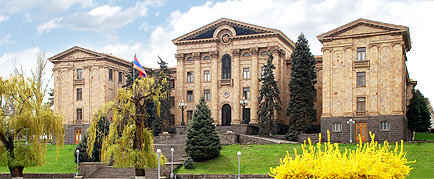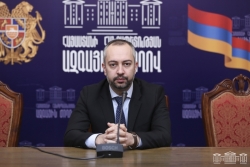The Chair of the Standing Committee on Foreign Relations of the National Assembly of Armenia, the member of the Armenian delegation to PACE Eduard Aghajanyan delivered a speech at the Plenary Sitting of PACE Spring Session on April 28. He particularly said in his speech:
“Thank you Mr. Chair,
I would like to thank the rapporteur for the profound research on the way of making the report. Overall, I do agree with most of the points and assertions stated in the conclusion. It is worth mentioning however, that the report deals with the issue mainly viewing it through 2 perspectives.
1. The long-term perspective
2. Post-covid perspective
In the first case, when analyzing causes of democratic backslide in European countries, the author refers to assertions according to which this process is of crawling nature and doesn’t happen overnight, and that instead it is a gradual process of an average of 40 years.
In the second case, the report focuses on need to safeguarding democracy particularly in the face of Covid-19 pandemic and its aftermath, often referring to prior resolution on this topic, such as the one named “Democracies facing the Covid-19 pandemic.” And overall, if addressing the issue from the abovementioned standpoints, there would be little to add to the report. And most probably, if Armenia was a part of the sample being researched, it should be an outlier in the following context:
Armenia has chosen the path of real democracy since the velvet revolution took place on May 2018. And since then, there have been 2 major threats to its democracy:
- The oligarch system, which ever since has been trying to return to power.
- External threats, namely the situation with neighboring countries aggression towards Armenia.
Unfortunately, the report doesn’t address the first challenge that Armenian democracy is facing. The report stresses the importance of tackling things such as excessive control over media, hate speech in politics, deep state and the need of financial transparency, all of which are considered as tools in the hands of the ruling elite.
However, it completely ignores situations where the opposition not only possesses the mentioned tools of influence, but regularly puts them in action. And this, ladies and gentlemen is the case in Armenia, which should be considered and looked into as well. Because it so happens that when the country abides to all of the criteria quite carefully mentioned in the report being in a transitional period from autocracy to full democracy, the system reacts very slowly and that in turn results in unfulfilled expectations, as well as questioning of democracy as a viable system. I believe, this would be an interesting case study for further research.
Quite fairly, the report states that for the Council of Europe member States this is not just a responsibility that the authorities have vis-à-vis their citizens but also one which each member State has vis-à-vis all the others, because only genuine democracies can ensure “the pursuit of peace based upon justice and international co- operation”, as advocated by the Organisation’s Statute. It also provides statistical evidence of rising hate speech and xenophobia, and the way this affects democracies in practice. Unfortunately, most recently Armenia has been continuously subjected to Azerbaijani military aggression, as well as in the form of hate speech and xenophobic rhetoric from their highest officials including the president of the country.
Ladies & gentlemen, in the past few days our colleagues form Azerbaijan have been talking about the importance of peace building and their readiness to get involved in those talks, something which has been reiterated by Armenian officials of all levels. However, we believe that the accomplishment of genuine peace on the ground requires first and foremost the acceptance of realities and the further political repercussions implied thereof.
To conclude, I would like to reiterate my approval of the report, simultaneously underlining the need to apply more scopes in addressing such an important and encompassing issue.” Eduard Aghajanyan noted.





